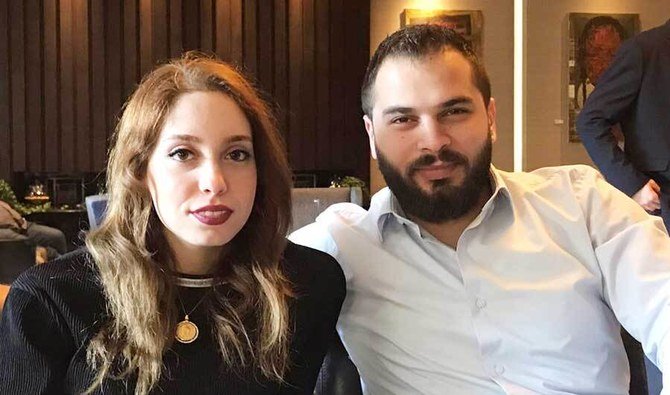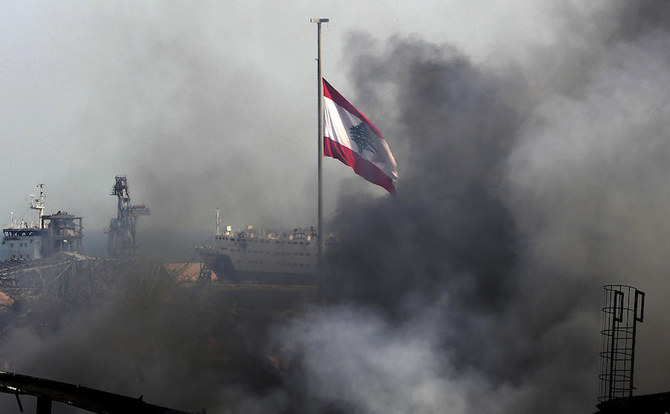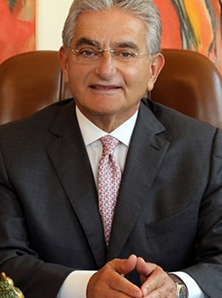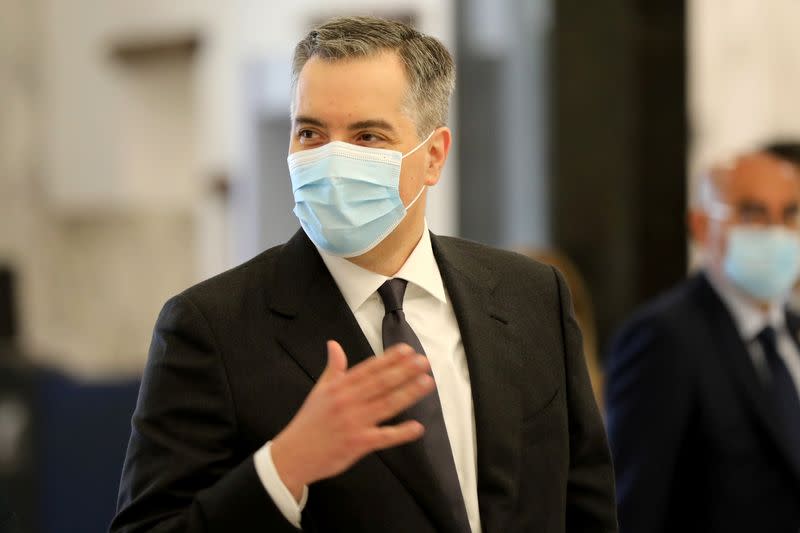
by arabnews.com — BEIRUT: It’s every parent’s worst nightmare – a newborn baby taken from his mother’s arms and lost, and yet that’s what happened to a young Lebanese couple moments after the birth of their son in an Istanbul hospital.. Mohammed Salim, 27, and Jana Al-Qawzi, 23, had just welcomed their newborn baby boy into the world when staff took him from his mother’s arms – he has not been seen since. Four months ago the couple had moved to Turkey in the hope of a new and better life, but instead are now in a desperate search for answers over the disappearance of their son. They say the hospital authorities have failed to give them a convincing explanation of the fate of their baby, who was taken from his mother’s arms moments after being born and vanished. Jana’s mother, Nada Al-Qawzi, who works at the American University of Beirut, said “her daughter is devastated and inconsolable.”
She told Arab News: “Jana wanted to offer her unborn child a shot at a better life, so she decided to leave Lebanon, knowing that Mohammed owned a hardware store and Jana was an employee at a private hospital in Beirut. “In Istanbul, they both found work and her pregnancy was normal. However, in the sixth month of pregnancy, doctors told my daughter that the baby’s heartbeats were slowing. A month later, Jana complained of abdominal pain and her doctor told her she should give birth immediately. “That is when Jana and Mohammed’s tragedy began.” Jana said that she cannot escape the nightmare she has been living in since July. “My tears have dried, but I am on painkillers,” she said. The couple’s residence permit in Turkey has expired, but Jana is refusing to leave without knowing the fate of her newborn in the Okmeydani hospital in Istanbul. As a non-Turkish citizen, Jana had to pay the hospital 4,000 Turkish liras ($528) on July 5. But when she checked with the local authorities, they made the hospital admit her for free. In the hospital, Jana was left alone in the delivery room after labor was induced. Her husband was not allowed to stay with her because other women were giving birth nearby. Jana’s mother said that when her daughter gave birth, she was shocked that the baby was “so little and kind of blue-ish.”

CNA Staff,(CNA).- President Donald Trump on Saturday signaled he would soon nominate a potential replacement to the late Supreme Court Justice Ruth Bader Ginsburg, who died Friday evening at 87. Judge Amy Coney Barrett, a Catholic mother of seven, is widely reported to be the front-runner in the president’s deliberations regarding a nominee. “.@GOP We were put in this position of power and importance to make decisions for the people who so proudly elected us, the most important of which has long been considered to be the selection of United States Supreme Court Justices. We have this obligation, without delay!” the president tweeted Saturday morning. Barrett, a federal judge on the 7th Circuit Court of Appeals, is reported to lead the president’s short list, and was also a contender for Trump’s second Supreme Court nomination in 2018, before the president nominated Justice Brett Kavanaugh.
According to Axios, Trump in 2018 said of Barrett that he was “saving her for Ginsburg” in explanation of his decision not to appoint her to the Supreme Court seat vacated by Justice Anthony Kennedy. Appointed a federal judge in 2017, Barrett had been a professor at Notre Dame’s law school until her nomination was confirmed. Barrett has twice been honored as “Distinguished Professor of the Year” at Notre Dame, and was a law clerk for Supreme Court Justice Antonin Scalia. As a nominee to the federal bench, Barrett was pointedly questioned by Democratic senators on the Judiciary Committee in 2017 on how her Catholic faith would influence her decisions as a judge on cases of abortion and same-sex marriage. During confirmation hearings, Senator Diane Feinstein said of Barrett’s Catholicism “the conclusion one draws is that the dogma lives loudly within you. And that’s of concern.” “You’re controversial because many of us that have lived our lives as women really recognize the value of finally being able to control our reproductive systems,” she said. “And Roe entered into that, obviously.” Barrett repeatedly said that as a judge, she would uphold the law of the land, but many pro-life groups believe she would be open to overturning the precedent of Roe vs. Wade, and uphold state restrictions on abortion. Pro-life groups hailed Barrett’s 2017 appointment to the bench.

by arabnews.com — reuters — BEIRUT: A party founded by Lebanon’s Christian president made a proposal to end a dispute that has blocked the formation of a new cabinet and threatened a French drive to lift the country out of its worst crisis since the 1975-1990 civil war. The proposal, put forward on Saturday, involved handing major ministries to smaller sectarian groups in a country where power is shared between Muslims and Christians. There was no immediate comment from Shiite Muslim groups, which have insisted they choose who fills several posts. But a political source familiar with the thinking of dominant Shiite groups said the idea was unlikely to work.
Lebanon’s efforts to swiftly form a new government have run into the sand over how to pick ministers in a country where political loyalties mostly follow sectarian religious lines. A Sept. 15 deadline agreed with France to name a cabinet has passed. Paris, which is leading an international push to haul Lebanon back from economic collapse, has voiced exasperation and told Beirut to act “without delay.” The leader of the Free Patriotic Movement (FPM), the party founded by President Michel Aoun and allied to Hezbollah, proposed “undertaking an experiment to distribute the so-called sovereign ministries to smaller sects, specifically to the Druze, Alawites, Armenians and Christian minorities.” The statement was issued after Gebran Bassil, FPM head and son-in-law of the president, chaired a meeting of the party’s political leadership. Bassil is a Maronite, Lebanon’s largest Christian community.
aawsat.com — French President Emmanuel Macron called Lebanese leaders on Friday over stalled efforts to form a new government, a diplomatic source said, as Paris seeks to give a new push to its bid to pull the country out of a deep financial crisis. France has been leaning on Lebanon’s sectarian politicians to name a […]

FILE PHOTO: Salim Sfeir, chairman of the Association of Banks in Lebanon and chief executive of Bank of Beirut, is pictured during an interview with Reuters in Beirut, Lebanon July 22, 2019. REUTERS/Mohamed Azakir BEIRUT (Reuters) –
by reuters –– A French official has said it might be difficult for Lebanon’s banks to prevent savers losing some of their deposits, according to the minutes of a meeting in which France outlined steps to help the crippled banking industry. The comments were made during Sept. 10 talks in Paris between senior French officials and a delegation from the Association of Banks in Lebanon (ABL). Reuters reviewed a copy of the minutes, marked confidential. France has taken the lead in international efforts to push Lebanon’s fractious politicians to implement reforms needed to attract aid and ease a crisis that has paralysed the banking sector, shutting depositors out of most of their funds. “While it is a matter of principle for the ABL that depositors should bear no losses, it may be difficult to defend this to the end. But this is a matter of negotiation,” Pierre Duquesne, President Emmanuel Macron’s envoy to coordinate international support for Lebanon, said, according to the minutes.
Lebanon’s central bank and commercial bankers have sought to prevent a “haircut”, or formal reduction in balances held on deposit accounts. But savers with U.S. dollar accounts in Lebanon say they have already lost money as they cannot access funds or can only do so by exchanging into Lebanese pounds below market rates. The Lebanese pound, which was pegged to the dollar for more than two decades, has crashed during the financial crisis. The French Foreign Ministry had no immediate comment.

by thenational.ae — Joyce Karam — The US announced sanctions on Lebanon-based Arch Consulting and Meamar Construction on Thursday, a week after it backlisted two former ministers accused of enabling Hezbollah. The US said it sanctioned the two companies for being owned, controlled, or directed by Hezbollah. It also added Hezbollah Executive Council official Sultan Khalifah Asaad, who it said was tied to both companies, to its OFAC list of sanctioned individuals. “Through Hezbollah’s exploitation of the Lebanese economy and manipulation of corrupt Lebanese officials, companies associated with the terrorist organisation are awarded government contracts,” said Secretary of the Treasury Steven Mnuchin. “The United States remains committed to targeting Hezbollah and its supporters as they corruptly abuse Lebanese resources to enrich their leaders while the Lebanese people suffer from inadequate services.”
The US Treasury said that both companies funnelled money to the leadership of Hezbollah from government and private contracts with the assistance of former Lebanese transport minister Youssef Fenianos and former finance minister Ali Hassan Khalil – two officials hit with sanctions on September 8. Seperatly on Thursday, the US sanctioned two Iranian entities and 45 associated individuals who carried out a malware campaign targeting Iranian dissidents, journalists and international travel companies. The sanctions on entities tied to Hezbollah financing came as the Iran-backed political-party-cum-militia said it was standing firm on its insistence to name ministers to the new government despite attempts to form a technical administration free of political appointees. Hezbollah said on Thursday that it would be naming a Shiite as the next finance minister, despite the issue stalling the formation of the new government and attempts by French President Emmanuel Macron to broker a new political initiative to pass reforms needed to drag the country out of the worst economic crisis in decades and rebuild the shattered capital after a massive explosion on August 4.
Prime Minister-designate Mustapha Adib met with President Michel Aoun on Thursday to discuss the stalled formation of government. He said afterwards that they agreed to allow more time to form a new administration. Firas Maksad, a Professor at George Washington University, saw the sanctions as part of Washington’s strategy to attempt to isolate Hezbollah and limit Iran’s leverage in Beirut. “The US administration is utilising targeted sanctions as a cost-free tool against Iranian influence in Beirut. At a minimum, this strategy could help distance Hezbollah from some of its allies. Whether it can succeed in encouraging the formation of a more neutral technocratic government remains to be seen,” Mr Maksad told The National. “In Beirut, the French initiative to form a neutral technocratic government is on its last leg. Another indication that Iran and Hezbollah are unwilling to cede any influence ahead of the US elections, risking a catastrophic financial crisis for Lebanon in the process.”
by cfr.org — The government’s inefficacy is tied to the sectarian political order enshrined in a 1943 agreement. To reflect the major religious groups among the population of nearly seven million, a Sunni Muslim serves as prime minister, a Maronite Christian as president, and a Shiite Muslim as the speaker of parliament. But by concentrating […]

by Written By Shubham Bose – republicworld.com — French President Emmanuel Macron said he regrets the failure of Lebanese lawmakers at forming a new government as per the 15-day deadline agreed upon by both countries. The statement was released by his office on Wednesday, September 16. According to reports, the deadline was set as a part of Macron’s initiative in Lebanon following the events of the Beirut blast and the French President has been pressing the Lebanese lawmakers to select experts to the ‘Crisis Cabinet’ who could guide the country out of its current political and economic turmoil.
‘Not too late’ to form government: Macron
As per reports, despite missing the deadline, Macron has expressed that it is not too late for Lebanon to form a crisis cabinet. However, opposing political parties in Lebanon are unable to reach a consensus regarding the appointment of key portfolios such as the Finance Ministry. According to reports, the French President in his statement said, “It is not yet too late: everyone must assume their responsibilities and finally act in the sole interest of Lebanon by allowing Moustapha Adib to form a government that reflects the seriousness of the situation.” Moustapha Adib is the current Prime Minister-designate of Lebanon who took the top chair following the resignation of the elected Lebanese government in the wake of public anger.

BEIRUT (Reuters) – Lebanon’s factional rivalries put the brakes on moves to form a new government on Monday on the eve of a deadline agreed with France and stalling efforts to exit a dire economic crisis. Prime Minister-designate Mustapha Adib met President Michel Aoun for talks after two leading politicians objected to the way the cabinet was being formed. Political sources said Adib did not present a list of ministerial names as had been anticipated. Missing Tuesday’s deadline could prove an early blow to a French effort to secure agreement from fractious politicians on reforms to root out corruption in return for foreign aid needed to resolve the worst crisis since Lebanon’s 1975-1990 civil war.
France’s Foreign Ministry said Lebanese politicians needed to deliver on their promise to agree on a cabinet. “It is up to them to translate this commitment into action without delay,” spokeswoman Agnes von der Muhll said. President Emmanuel Macron said on Sept. 1, during a visit a month after a devastating Beirut port blast, that Lebanese politicians agreed to form a cabinet in 15 days, or by Tuesday, an ambitious timeline given it usually takes months. “The parties still have to fall into line,” a French Elysee official said. After meeting Aoun, Lebanon’s prime minister-designate told reporters: “God willing, all will be well.” Sources with knowledge of the meeting said Adib told the Lebanese president he would return in a few days while Aoun consulted with various factions.
‘TAKE A BREATH’





